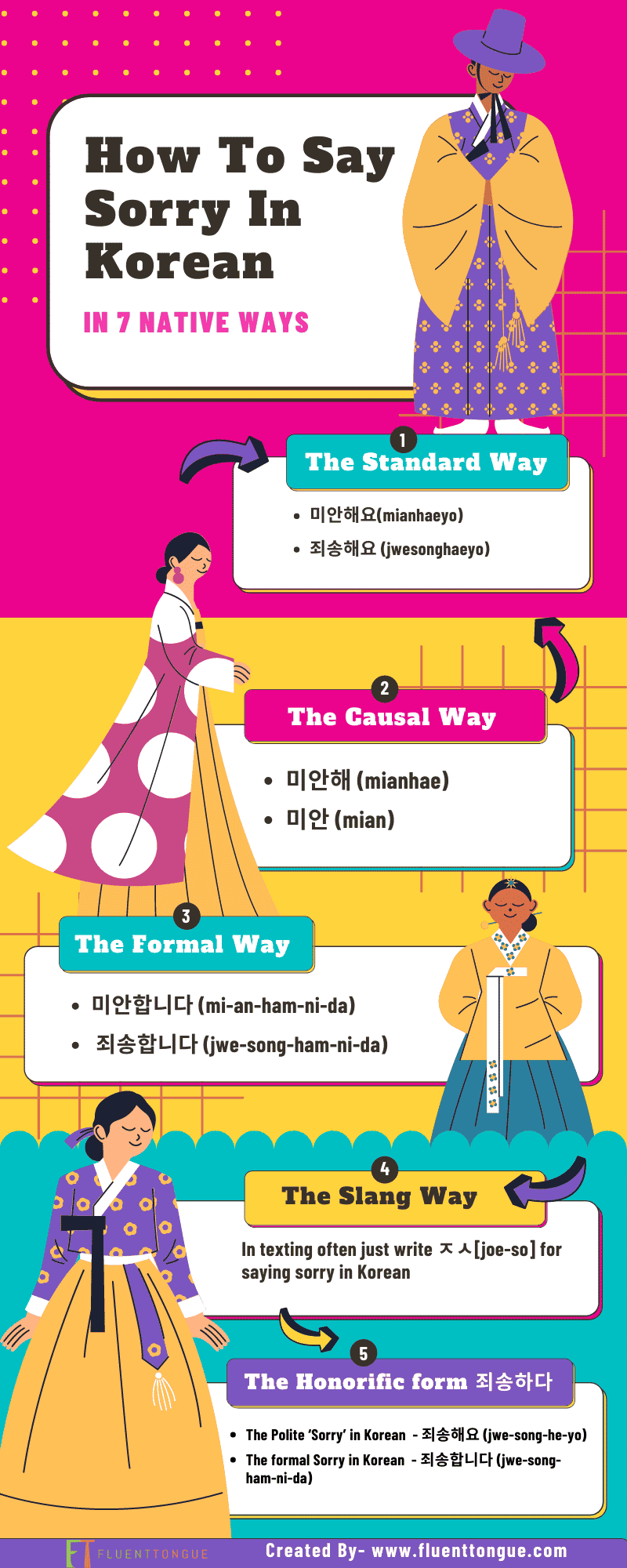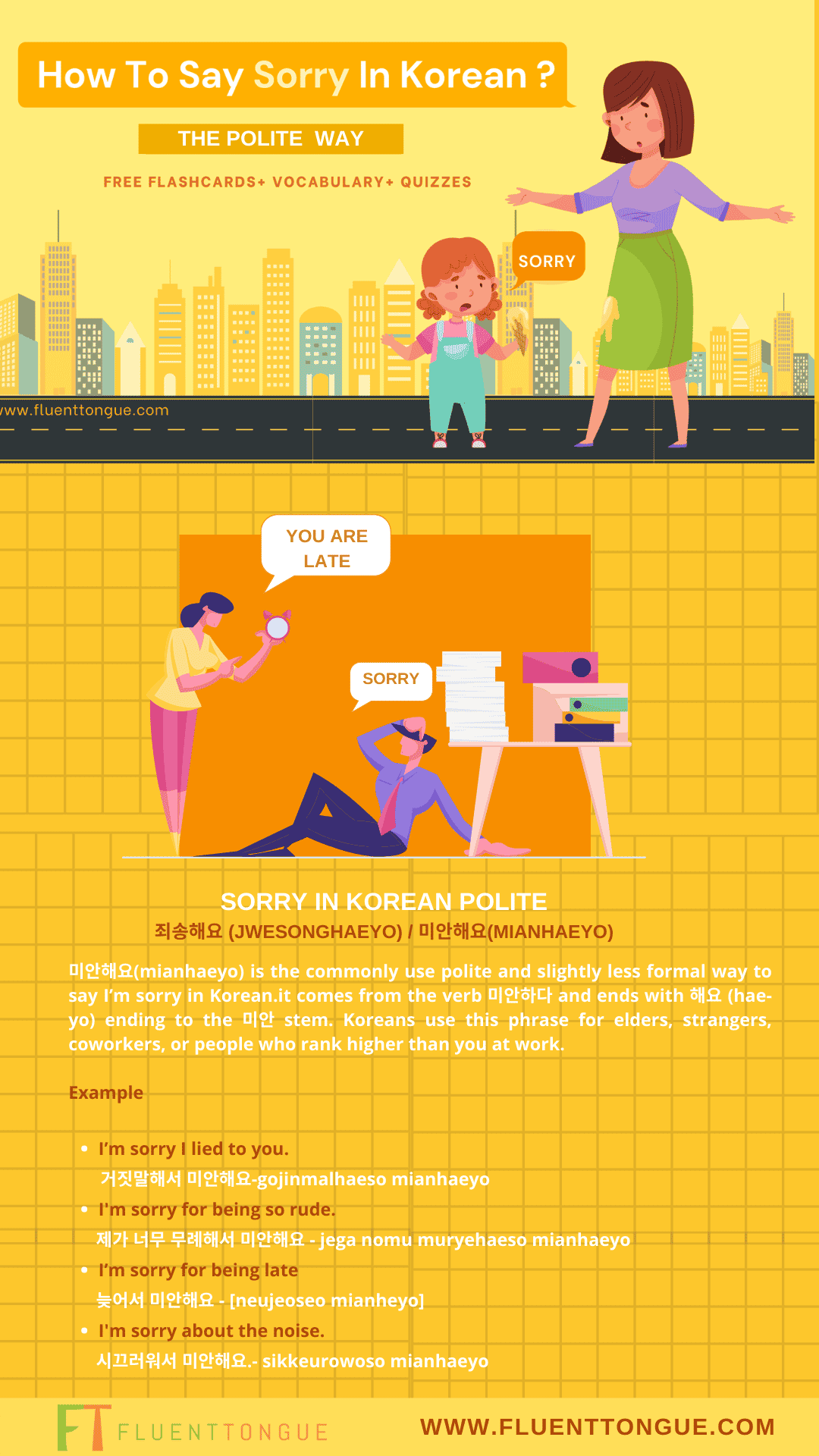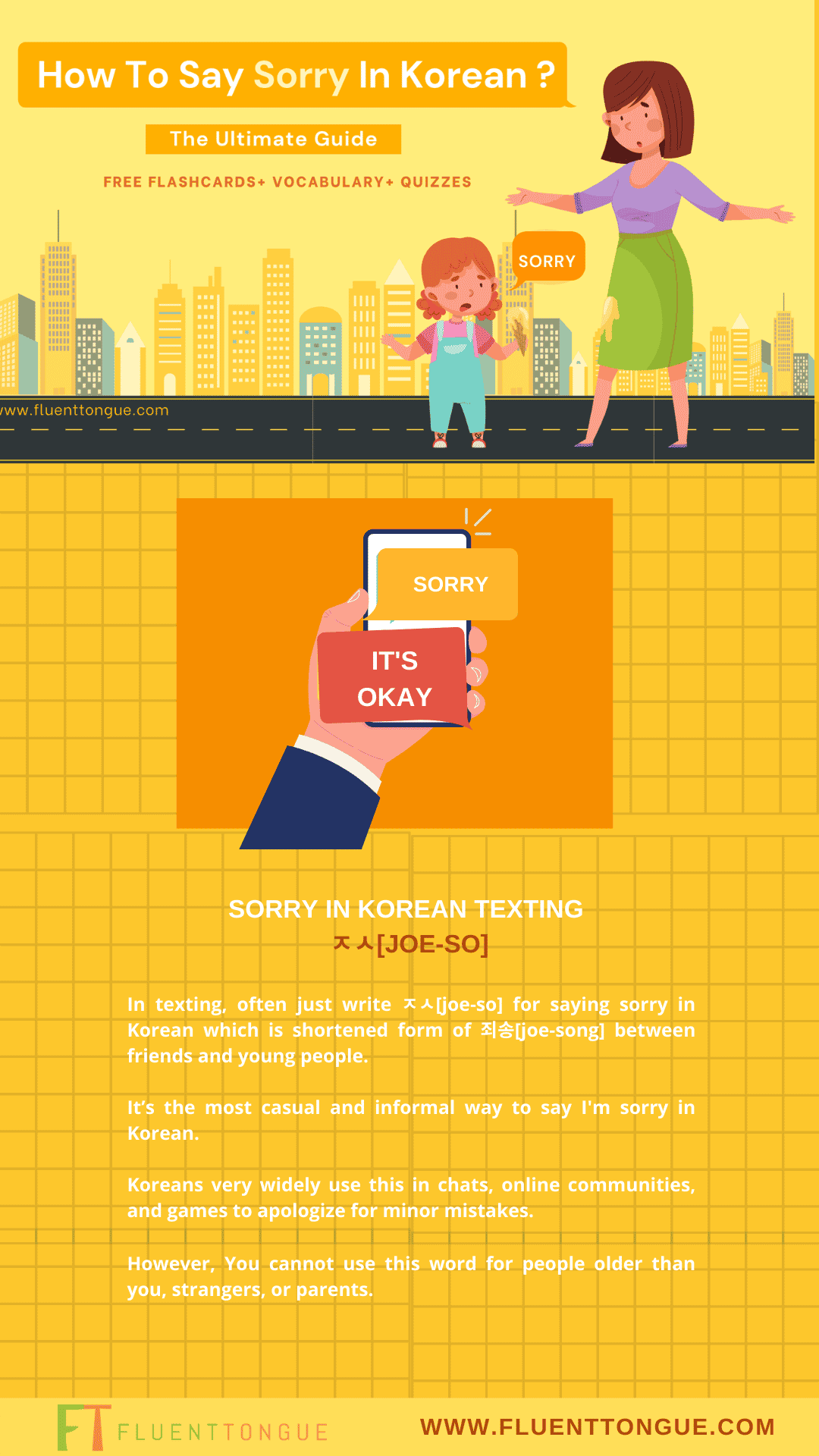Introduction
Did You spill someone’s coffee, hurt someone’s feelings, or a mistake at work today and you want to say “I’m sorry” in Korean?
Of course, you can say 죄송합니다 (jwe-song-ham-ni-da) or 미안해요 (mi-an-hae-yo) to apologize.
But is it enough? Not exactly
Like English, there are 20 different ways you can use to apologize in Korean depending on the age of the person who you are talking to and in what situations.
Just one word sounds less meaningful and feels like you don’t actually mean it.
here we’ll Learn informal, formal, polite, and 20 alternate Korean phrases to say sorry in Korean. Get a FREE cheat sheet, flashcards, and lesson PDF to apologize like a native.
All right world, it’s time to dig in(to the core).
Table of Contents
HOW TO SAY SORRY IN Korean?(informal vs formal)

죄송합니다 (jwe-song-ham-ni-da) is the basic and formal way to say sorry in Korean. You can also use 미안해요 (mi-an-hae-yo) or 죄송해요 (jwe-song-he-yo) to apologize in Korean politely. However, while apologizing to friends/ casual situations, just use 미안해 (mi-an-he) or 미안(mi-an).
죄송합니다 (jwe-song-ham-ni-da) and 미안해요 (mi-an-hae-yo) are nearly the same.
but
The only difference between 죄송합니다 (jwe-song-ham-ni-da) and 미안해요 (mi-an-hae-yo) is that “죄송합니다” comes from a sino Korean word “죄송[]” and sounds respectable to express sorry than the other. 미안해요 is frequently used among casual friends and coworkers.
Here is how to Say ‘I’m Sorry’ in Korean ( informal, formal, and polite ways) like a native Korean speaker
- Standard ‘Sorry’ in Korean -죄송해요 (jwesonghaeyo) or 미안해요(mianhaeyo)
- Sorry in Korean informal -미안해 (mianhae) or just 미안 (mian)
- Sorry in Korean formal -미안합니다 (mi-an-ham-ni-da) / 죄송합니다 (jwe-song-ham-ni-da)
Did you know?
As you can see, 미안해요/미안해/ 미안합니다 all comes from the word 미안하다which is a verb that means “to be sorry”, and a combination of the noun 미안[mi-an]( means ‘sorry’) and the verb 하다[ha-da](means ‘to do’).
There are different levels of formality for ‘I’m sorry in Korean (Conjugating the base form 미안하다)
Now, let’s take a deeper look at how to translate “I’m sorry in Korean”.
SORRY IN Korean POLITE- how do you say 미안해요 (mi-an-hae-yo)?

If you are thinking about how do you say sorry in Korean, just memorize this phrase.
Chances are you‘ll end up hearing it multiple times in everyday life.
미안해요(mianhaeyo) is the most commonly used polite and slightly less formal way to say I’m sorry in Korean. It comes from the verb 미안하다 and ends with 해요 (hae-yo) ending to the 미안 stem.
Koreans use this phrase for elders, strangers, coworkers, or people who rank higher than them at work.
Examples
- I’m sorry I lied to you.
거짓말해서 미안해요-gojinmalhaeso mianhaeyo
- I’m sorry for being so rude.
제가 너무 무례해서 미안해요 – jega nomu muryehaeso mianhaeyo
- I’m sorry for being late
늦어서 미안해요 – [neujeoseo mianheyo]
- I’m sorry about the noise.
시끄러워서 미안해요.- sikkeurowoso mianhaeyo
Did you know?
- I’m sorry. I have appointments all day.
미안해요. 하루 종일 약속이 있어요. – mianhaeyo haru jongil yakssogi issoyo
- I’m really sorry
정말 미안해요.- jongmal mianhaeyo
- Sorry for the late reply
늦게 답장해서 미안해요 – neutkke dapjjanghaeso mianhaeyo
Sorry In Korean Formal – 미안합니다 (mi-an-ham-ni-da)

미안합니다 (mi-an-ham-ni-da) is the most formal way to express I’m sorry in Korean language using the 미안 stem (just add 합니다 (ham-ni-da) to 미안).
You can use this phrase when you apologize to elders in your family or your seniors at work or someone you don’t know well.
However, Koreans commonly use 죄송합니다 in everyday formal situations as it sounds more respectful than 미안합니다 (mi-an-ham-ni-da)
Examples
- Sorry for making a mistake.
실수해서 미안합니다 – silsuhaeso mianhamnida
- Sorry to trouble you.
폐를 끼쳐 미안합니다 – pyereul kkicho mianhamnida
- I’m sorry. I have the wrong number.
미안합니다. 잘못 걸었습니다 – mianhamnida jalmot gorotsseumnida
- I’m sorry. I’ll send you a message again
미안합니다. 메시지를 다시 보내겠습니다. – mianhamnida mesijireul dasi bonaegetsseumnida
- Sorry, this counter is closed.
미안합니다. 계산대는 끝났습니다.
SORRY IN Korean INFORMAL-how to say 미안해 (mi-an-he) or 미안(mi-an) in Korean language?

Here is how to say sorry in Korean in informal situations.
- 미안해 (mianhae)
- 미안[mi-an]
미안해 (mianhae)
The meaning of 미안해 (mianhae) in Korean comes from the word 미안하다( mianhada) which literally means “to be sorry”(add해 (hae) to the 미안 stem).
This is the commonly used informal way to say sorry in Korean.
When to use
You can use this phrase with young children, close friends, close family members of the same age (e.g. siblings and cousins), or in boyfriend-girlfriend relationships to apologize in Korean.
Did you know?
How to use
Example
- Sorry for the mess.
지저분하게 해서 미안해.-jijobunhage haeso mianhae
- I’m sorry for everything.
모든게 미안해.-modeunge mianhae.
- I’m sorry for eating chicken alone
혼자 치킨을 먹어서 미안해.- honja chikineul mogoso mianhae
- i’m really sorry for getting angry
화내서 정말 미안해. – hwanaeso jongmal mianhae
- I’m sorry to have kept you waiting.
기다리게 해서 미안해.
- I said I’m sorry. Please forgive me.
미안해 용서해 줘.
미안[mi-an]
미안[mi-an] literally means sorry in Korean. It is the most informal and playful way of apologizing in Korean.
If you want to say “I am sorry in Korean” to children or people younger than you for minor mistakes, just simply say 미안 casually.
미안 (mian) can also mean “no” in some situations. For example, when you’re invited to a party organized by your friend and want to politely decline, you can simply say 미안 (mian).
So you never sound rude again while conveying what you need to.
How to use
Example
- Sorry, it was my mistake.
미안, 내 실수야 – mian nae silsuya
- Oops sorry, my mistake
아 미안, 내 실수 – a mian nae silsu
- Sorry, I have to go now.
미안, 나 지금 가야 해.-mian na jigeum gaya hae
How to say sorry in Korean using미안하다 [mianhada]
The verb 미안하다 [mianhada] seems to be used by older people who need to apologize to younger people, especially their children, they might say sorry using the word 미안하다 (which is not conjugated)
In Korea, the older generation doesn’t find it comfortable to apologize to their children, if they have to, Korean use the verb 미안하다 without conjugating it.
Let me explain with an example
- I am sorry , kiddo
미안하다 얘야 – mianhada yaeya
- Mommy is sorry
엄마가 미안하다 – ommaga mianhada
- i am sorry , son
미안하다 아들아 – mianhada adeura
How to say sorry in Korean using The Honorific form 죄송하다 (jwe-song-ha-da)
“죄송하다” is the base form of apologizing in Korean. It can be conjugated into formal and polite forms. In formal situations like offices, institutions, and schools, use “죄송합니다” (jwesonghamnida).
This honorific form is also appropriate when speaking to older individuals. “죄송해요” (jwesonghaeyo) is still polite but more casual.
You can use “죄송해” (jwesonghae) when speaking to peers, younger people, or close friends.
Here is How to Say Sorry in Korean in a formal way using The Honorific form 죄송하다 (jwe-song-ha-da) and phrases you need to know in order to apologize in Korean like a native Korean speaker.
- The Polite ‘Sorry’ in Korean (using 죄송)-죄송해요 (jwe-song-he-yo)
- The formal Sorry in Korean (using 죄송) -죄송합니다 (jwe-song-ham-ni-da)
죄송합니다 (Joe-song-ham-ni-da): how do you say sorry in Korean using 죄송하다.
죄송합니다 (jwe-song-ham-ni-da) is the commonly used and formal way to say sorry in Korean. It comes from the Chinese word 죄송 [jwe-song] (literally means ‘sorry ) and sounds more respectful when you apologize in Korean.
If you want to be really formal and show respect, it’s safer to use 죄송합니다 (Joe-song-ham-ni-da) or 미안해요 (mi-an-hae-yo).
When to use
You can use this in situations like apologizing to your professor or older people, seniors at work, in job interviews, or strangers you met on the street.
죄송하다 does not have any informal way. so you may have heard that service industry workers widely use 죄송합니다 (jwe-song-ham-ni-da) while apologizing to the customer.
How to use
- I’m sorry. It’s my mistake.
죄송합니다. 제 실수입니다. – jwesonghamnida je silsuimnida
- I’m sorry. we’re closed.
죄송합니다. 영업시간이 끝났습니다.
jwesonghamnida yongopssigani kkeunnatsseumnida
- We’re very sorry about that.
정말 죄송합니다.-jongmal jwesonghamnida
죄송해요 (Joe-song-hae-yo): The polite way to say sorry in Korean using 죄송하다.
죄송해요 (Joe-song-hae-yo) is a polite way to say sorry in Korean language but sounds less formal than 죄송합니다 (jwe-song-ham-ni-da).
Just use it while apologizing to your colleagues, elders( like parents or grandparents ), and people who are older than you.
If you are not sure, just stick to 죄송합니다. (joesonghamnida.).
How to use
While you are saying sorry in Korean, your body language is very important in Korea. If you realize you’ve done something wrong, you need to slightly bow your head and look down as you say “I’m sorry” in Korean.
So that you look sincere, as if you really mean what you’re saying (and direct eye contact is considered rude in Korean culture).
Learn Korean quick tips:
Example
Sorry. It’s all my fault.
죄송해요. 다 제 잘못이에요.- jwesonghaeyo da je jalmosieyo
the Difference between 미안하다 & 죄송하다(죄송 vs 미안)
The basic difference between main 미안 and 죄송 chesong is that 죄송 is a Sino Korean word and sounds more formal than mian미안 which is a native Korean word.
Example
- I’m sorry for getting angry
늦어서 미안해요-[neujeoseo mianheyo]
- I’m sorry for getting angry
늦어서 죄송해요- [neujeoseo joisongheyo]
I m sorry for making a mistake
SORRY IN Korean TEXTING – ㅈㅅ[joe-so]

In texting, often just write ㅈㅅ[joe-so] for saying sorry in Korean which is shortened form of 죄송[joe-song] between friends and young people.
It’s the most casual and informal way to say I’m sorry in Korean.
Koreans very widely use this in chats, online communities, and games to apologize for minor mistakes.
However, You cannot use this word for people older than you, strangers, or parents.
송구하옵니다(songguhaomnida): how to say SORRY IN TRADITIONAL Korean DRAMA
Are you addicted to Korean dramas? then this phrase is for you.
송구하옵니다(songguhaomnida) is a very old phrase spoken in ancient Korea for a long time ago. It is no longer used in modern Korea.The meaning of comes송구하옵니다 from the word 송구하다 (songguhada) which literally means “sorry.” But is a more formal way of an apology than just a casual 미안해.
So you might have heard this phrase in Korean historical dramas.
How to say ‘I’m sorry to hear that’ in Korean(with examples): Korean sorry vs sorry in English.
In English, when someone’s pet dies or maybe someone’s lost a family member or maybe someone didn’t get a job or something we just say ‘sorry’ to express sympathy (e.g.“I am so sorry to hear about your dog” or “I’m sorry for your loss” ).
However, “I’m sorry” in Korean is not always 죄송합니다 [joe-song-ham-ni-da].
Here’s why
The only difference between Korean “sorry” and English “sorry” in English is that Korean use 죄송합니다 only when you really made a mistake or caused a problem and hurt someone’s feelings. So you want to apologize but not show regret for someone’s loss (unless you made that happen).
Then what do you say? I’m sorry to hear that in Korean
The dictionary equivalent expression of I‘m sorry to hear that in Korean is ugamimida . However, in everyday life situations, it sounds more formal and Koreans barely use it.
Here are the indirect and informal phrases you can use (instead of죄송합니다) to say I‘m sorry to hear that in Korean to really express regret for the other person’s loss.
- Seriously?
진짜요[jinjjayo]
- No way ? really?
말도안 돼? 오정말요?maldoan dwaeo? jongmalryo?
- What should I do?? Are you ok?
어떡해요? 괜찮아요? ottokaeyo? Gwaenchanayo?
It is different from the situations. People might say this when they hear someone got sick or hurt.
e.g. 어쩌다가 다쳤어요? (How did you/she/get hurt? What happened?)
빨리 낫길 바래요. (I hope you get well soon.)
When you hear someone’s pet died, you may respond like this.
e.g. 힘드시겠어요. (It must be a difficult time for you.) – honorific
힘들겠어요. – polite
힘들겠다. – casual
When you hear someone die, you may express your condolences like this.
e.g. 고인의 명복을 빕니다. (I hope he/she rest in peace.) – honorific
We mostly use honorific forms for expressing condolences when we hear about other bad things such as car accidents.
e.g. 괜찮으세요? (Are you OK?)
힘들겠어요. (It must be a difficult time for you.)
Stop saying 미안해요 (mi-an-hae-yo): 14 different ways to apologize in Korean.
Learning how to say sorry in Korean is very essential (especially if you are a beginner) just like other important phrases like thank you, goodbye, and hello in Korean
Did you know?
But sometimes saying the word “I am sorry” in Korean can feel a little less meaningful and feel like you don’t care or actually don’t mean it.
So when you really need to say sorry for something, the mistake you have made or some problem that you have created, it’s a good idea to use stronger expressions to show that you really mean it.
In English we use them like my apologies, my bad, it’s my fault, I apologize, I owe you an apology, and so on……
So do Koreans
Now we will learn 14 alternative ways to say “I’m sorry in Korean”(not ). You might have heard these phrases in Korean dramas or k pop songs native speakers often use to Apologize in Korean but didn’t notice well.
- Just a moment
잠시만요 (jamsimanyo)
- I sincerely apologize
진심으로 사과드립니다 – Jinsimeuro sagwadeurimnida.
- I made a mistake
제가 실수했어요. – jega silsuhaessoyo
- I won’t do it again.
다시는 안 그럴게 – dasineun an geurolge
- I was wrong/ it’s my fault
잘못했어요.- jalmotaessoyo
- I would like to apologize.
사과하고 싶어요 – Sagwahago sipeoyo.
- I take full responsibility.-
내 책임이에요.- Nae chaegimieyo.
- I hope you forgive me.
용서해 주길 바라요 – Yongseohae jugil barayo
- Please don’t be mad at me.-
제발 화내지 마세요 – Jebal hwanaeji maseyo.
- I shouldn’t have done it.
제가 그걸 하지 말았어야 했어요 – Jega geugeol haji marasseoya haesseoyo.
- “excuse me“/“I am sorry for interrupting.
실례합니다 (sillyehamnida)
- I didn’t mean that.
그걸 의미한 게 아냐 – Geugeol uimihan ge anya
- Let it slide this one
한 번만 봐주세요.- han bonman bwajuseyo
- I’m sorry about what I did earlier.
아깐 미안했어요. [ah-kgan mi-ahn-heh-ssuh-yo]
- Sorry for bothering you
귀찮게 해서 미안해
How to say“please Apologize” in Korean- 사과해요. (sa-gwa-he-yo)
사과 (sa-gwa) literally means apology in Korean. Apple in Korean is also called 사과. The verb 사과하다(sagwahada) means “to apologize “ and the honorific form is 사과드리다.
Here is how you can ask someone to apologize in Korean (i.e. to say “please apologize”) in a formal, informal, and polite way.
- Formal (Please apologize) – 사과하세요. (sa-gwa-ha-se-yo)
- Polite (Please apologize) – 사과해요. (sa-gwa-he-yo)
- Casual (Apologize) – 사과해. (sa-gwa-he)
Honorific form of “to apologize” in Korean – 사과드리다
사과드리다(sagwadeurida) is used to ask someone to apologize in a very respectful and formal way.. 사과드리다 is a combination of two words i.e. 사과(sa-gwa) means apology and 드리다 (deu-rida) means “to give” (in the honorific form).
Korean use this phrase when apologizing to older people or higher rank in the workplace
The only difference between 사과하다(sagwahada) and 사과드리다(sagwadeurida) is that you can use 사과드리다 when asking someone to apologize to someone else, not you, in a respectful way.
Here is how to ask someone to apologize using the Honorific form of “to apologize”사과드리다(sagwadeurida) in a respectful way.
- Please apologize: The formal way – 사과드리세요. (sa-gwa-deu-ri-se-yo)
- Please apologize: the polite way – 사과드려요. (sa-gwa-deu-ryeo-yo)
- Apologize The informal way– 사과드려. (sa-gwa-deu-ryeo)
How to Respond to “i’m Sorry” in Korean
If somebody apologizes to you, how are you gonna respond to that
In English we say “That’s okay, I am fine, forget about it, don’t worry “ about it, and so on…
if someone says sorry to you in Korean Mianhae (미안해)”, you can answer them like this phrases like 괜찮습니다.[gwaen chan seumnida] which means that’s okay. I am fine.
If somebody says I’m sorry as 죄송합니다[jwesonghamnida] , you can answer it with the phrase 괜찮습니다.[gwaen chan seumnida]. You can answer by saying this phrase 괜찮아요[gwaenchanayo] which means “It’s OK”.
When someone says I’m sorry in Korean with the phrases 사과해요. (sa-gwa-he-yo) / 미안해요(mian haeyo). If your friend is apologize to by saying 미안해 (mianhae), you can answer with 괜찮아[gwaenchana].
If someone is apologizing for a little too much and you think that it’s unnecessary/ becoming awkward, then just use the phrase 신경 쓰지 마세요
[singyong sseuji maseyo] which means “please don’t mind” or it could happen”그럴 수도있지[geurol sudoitjji]”.
미안해하지 마세요(mianhaehaji maseyo) means “don’t be sorry” in Korean. In a causal situation, just say 미안해하지 마(mianhae hajima)
Let’s take an example, shall we?
If you talking to your teacher and he made a mistake and apologize
Teacher: 미안합니다! (Mi-an-ham-ni-da)
Liz: 괜찮아요(gwaenchanayo)
How to use I ‘m sorry in Korean sentences
- I’m sorry for being selfish
이기적으로 굴어서 미안해요. – Igijeogeuro gureoseo mianhaeyo.-
- I won’t do it again
다시는 안할게요 – dasineun anhalkkeyo
- I will take the blame
내가 책임질게 – naega chaeg-imjilge
- It wasn’t my fault.
제 잘못이 아닙니다. – je jalmosi animnida
- I’m not responsible at all.
난 아무 책임도 없어. – nan amu chaegimdo opsso
- I am sorry for being late
늦어서 미안해요.Neujeoseo mianhaeyo.
- I sincerely apologize
진심으로 사과드려요 – jinsimeuro sagwadeuryoyo
- I am sorry for getting angry
화내서 미안해요. – hwanaeso mianhaeyo
- Teacher, it was my mistake, i am sorry
선생님 제 실수였어요 죄송합니다
seonsaengnim je silsuyeoss-eoyo joesonghabnida
- I apologize for being mean to you.
못되게 군 것 사과할게요. – Motdoege gun geot sagwahalgeyo.-
- Sorry, I don’t speak Korean
미안해요, 저 한국말 못해요. – mianhaeyo jo hangungmal motaeyo
- Please forgive me
용서해주세요 – yongsohaejuseyo
- Please let me off this once
이번 한 번만 봐주세요. – ibon han bonman bwajuseyo
- I am really sorry
정말 죄송합니다 – jeongmal joesonghabnida
How To Memorize Sorry in Korean Language In Minutes & Never Forgets It?
Say i’m sorry like Korean drama
It’s no secret that using the words in real-life dialogues is the way to memorize these piles of Korean words without lifting a finger.
So, why not start now
Here is a funny video I got on how to say I’m sorry in Korean (k-drama version)
Anki Isn’t The Only Game In Town. Sing As A Song
Did you know you can sing a song and master how to say sorry in Korean?
Well, what could be better than that?
Here is how Koreans do it all the time (now you can do it too!!!)
Dream High 2 OTS- I’m sorry (Jin Woon) 2 AM
Use Flashcard And Test
Maybe mnemonics is not your thing. What about flashcards?
I know it’s an old thing(you might be using Anki too)
But When it comes to mastering Korean vocabulary, you will never regret using these fellas.
https://quizlet.com/83263873/saying-sorry-in-Korean-flash-cards/
https://quizlet.com/267888501/im-sorry-and-okKorean-flash-cards/
https://www.cram.com/flashcards/essential-Korean-vocabulary-with-romanization-5718215
Other Online Resources
We live in the era of the 20th century.
And I bet you love to surf (well, who doesn’t?)
The internet is full of free stuff and language resources that you haven’t explored yet. Here is what I found when I was learning day of the week in Korean
Here is a list (I hope it might help you)
https://www.wikihow.com/Apologize-in-Korean
https://en.wikiversity.org/wiki/Korean_Language/Introduction
Conclusion and Korean Vocabulary Quiz
Anyone who is learning and new to Korean culture is most likely going to make some mistakes.
If you are in Korea and have probably made some sort of mistakes that you just aren’t sure of, you can tell them that you are still learning Korean.
Koreans are very helpful to correct your mistakes.
So be brave and use it as much as you can in your daily life.
Tell us what’s your story/ how you express your sorry recently in the comment below
we love to hear it
